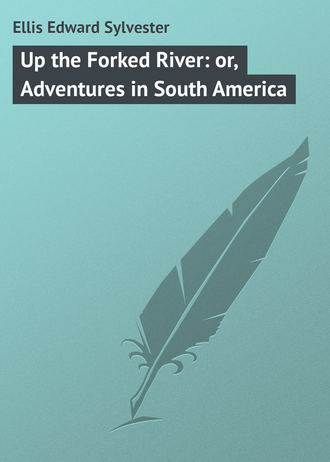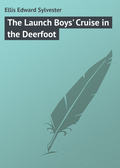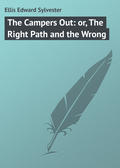
Ellis Edward Sylvester
Up the Forked River: or, Adventures in South America
CHAPTER XXXVI
The fire ant of the tropics does not merely bite into the animal or person who disturbs it, but bites out, as may be said. It abstracts a fragment of one’s anatomy, so that, had General Bambos been placed on a delicate pair of scales immediately before and after his nipping, there would have been an appreciable difference in his weight. Since Major Starland himself had suffered from the fierce little pest, he understood what had befallen the other. He tried to express his sympathy, but instead, threw back his head and gave way to merriment.
The victim was suffering too much from his hurt to pay heed to the laughter which must have struck him as untimely, but no doubt he would have turned on the American, had not the hoarse whistle of the tugboat sounded, and brought him hurrying from the cabin. They were nearing the bend of the river around which the Major had seen the catboat containing General Yozarro and his friends disappear. That Captain Ortega was right in what he said was proved by the emergence of the smaller craft from under the heavy foliage along shore. In answer to the signal of the tug, it glided out from shelter, propelled by two of the men with poles. The sail was not hoisted, for the wind had fallen to a calm. The Captain turned to meet the catboat, for he knew the depth of the water permitted him to run close to the bank, but he halted when a few rods away and waited for the other to come up.
General Yozarro could not be expected fully to understand the changed conditions, with the American yacht steaming forward a short way behind his own boat. Captain Ortega called out a brief explanation, and the men continued poling until the smaller craft lay alongside the larger one. General Bambos, holding to a stanchion with one hand, reached down with the other and helped his illustrious compatriot to climb upon his own property, the others following more nimbly, until all had transferred themselves, and the catboat was made fast by one of the crew.
The President of Zalapata, saluting and bowing low, conducted the other dignitary to the cabin, with the officers trailing after them. For the moment, Major Starland found his situation a trifle embarrassing. General Yozarro scowled savagely at him, but the others paid scant attention. There was some crowding, for it will be remembered that the apartment was of slight size. The American waited till a lull came in the conversation and then, with an elaborate military salute, said:
“General Yozarro, I have the honor of returning to you the boat which necessity compelled me to borrow last night.”
The General had seated himself on the lounge, at the risk of suffering the same mishap which had befallen his neighbor and still kept him slyly rubbing the injured part. He was too overflowing with rage to make any pretence to the courtesy which marked their previous chats. His prodigious mustache bristled, his thick lips trembled and his black eyes gleamed threateningly. He glared at the American, standing among his own officers, who made what room they could for him in the restricted space, and when he could command his tumultuous feelings, he spoke:
“You come to surrender the boat! You surrender yourself also, el Americano!”
“Well, hardly; I stayed aboard at the suggestion of my friend, General Bambos, that this thing might be done in due and ancient form. American citizens are not in the habit of surrendering at the demand or whim of any South American nobody.”
Removing his hat, the Major bowed low and smiled.
“Does he speak the truth?” bluntly asked General Yozarro, turning to Bambos. The face of the American flushed at the slur, but he held himself in hand.
“He does; he remained at my request,” said General Bambos with a nod.
“There were others who took part in this crime; one of them was Captain Guzman of your staff, General.”
“I need not assure you, General, that it was without my knowledge; I disavow what he did and will reprimand him; if Your Excellency demands it, I will have him shot.”
“Not much!” muttered Major Starland, loud enough for all to hear; “is that the way you reward one of your bravest officers, General Bambos?”
“I rule in Zalapata without the aid of los Americanos,” was the freezing reply.
“And without the aid of common gratitude and decency, —that is evident.”
“I will take the matter into consideration,” said General Yozarro, whose brain was not nimble enough to decide the simplest question off-hand. “At present, I do not demand the death of Captain Guzman, but I thank you for your words, General, which is only one of the many proofs I have received of your disinterested friendship.”
If the countenance of General Bambos had not already been as crimson as it could well be, he would have blushed. He saluted and muttered something about the pleasure he felt in deserving the regard of his distinguished compatriot.
General Yozarro strove to restrain his anger, but it was plain to every one that he was seething with rage. While Major Starland was wondering what could be the cause, the explosion came:
“One of my men, the basest of wretches, deserted my service yesterday and allied himself to Captain Guzman and to you. He sent me the most shockingly insulting of messages; since he is not on this boat, he must be on the other.”
“Such is the fact, General,” replied the Major, compressing his lips, but looking straight into the eyes of the other.
“He must be surrendered to me.”
“I receive no orders from you; you murdered the brother of Martella, though he had done nothing wrong; the message he sent to you was not respectful perhaps, but it was better than you deserved; Martella has done me and mine the best of service, and he shall never be surrendered to you.”
The fury of General Yozarro threatened to suffocate him. He rose to his feet and the others glanced apprehensively at the face of the man who had dared to defy the terrible Dictator, and who folded his arms and still looked him calmly in the eye.
“El Americano, you are here on my boat and here you will stay till that deserter takes your place. I give you the choice; if he is not turned over to me to be shot, you shall be shot in his stead.”
With all his contempt for this man, Jack Starland had never dreamed of anything like this. The words of Captain Ortega came back to him. There was a certain shadowy strength in the position of General Yozarro. No flag of truce had been called into use, and the American, after having forcibly captured the boat of the other, had voluntarily placed himself in his power, following the suggestion of General Bambos and his own impulses.
It was Bambos who broke the oppressive hush by saying to him:
“The words of General Yozarro are just; comply with what he demands, and he will be glad to restore you to your friends; am I not correct, General?”
“I suppose so,” was the sour response.
“Then my answer is that I’ll see the whole gang of you hanged first! You don’t get Martella without the biggest fight of your lives, and you don’t keep me on this old tub without a bigger fight; I’m not afraid of the whole pack of jail birds of you!”
CHAPTER XXXVII
Arrest him!” commanded General Yozarro, speaking directly to Colonel Carlos Del Valle, his chief of staff, standing next to the American; “put him in irons.”
The officer addressed reached out his hand to lay on the shoulder of Jack Starland, who, at that instant, recalled the knockout blow he had given Cadet Hillman of the First Class, one memorable spring morning at old Fort Putnam, West Point. It was the same lightning-like stroke which crashed into the face of the colonel and sent him staggering and toppling back to the opposite side of the cabin. Then, whipping out his revolver, Starland backed from the cabin, ran down the steps to the bow of the boat, and before any one suspected his purpose, shouted to his own executive officer:
“Captain Winton, I am betrayed! Open fire, and sink this tug!”
Then he wheeled about and with leveled weapon, added:
“I will kill the first man who attempts to lay a finger on me!”
General Yozarro and his officers showed more promptitude than would have been expected. Seeing that a conflict was inevitable, they set out to win by their own quickness. Their armament was heavier than that of the American yacht, – that is to say, though his pieces carried smaller missiles, he had two of them, while that of the Warrenia was a brass saluting twelve-pounder.
The port gun was slewed around and pointed at the other craft, now within twenty-five yards, and in a twinkling it bore fairly.
“Fire!” shouted the excited General, too savage to regard the usual preliminaries.
Major Starland shuddered, for he saw the gun seemingly directed true and knew it must do great destruction on his yacht. The gunner snapped the lanyard, but a dull click followed and there was no discharge.
General Yozarro uttered an oath and Captain Ortega called from the pilot house:
“That is the one which was not loaded!”
Jack Starland had forgotten the fact in the flurry of the moment. He smiled and looked across at his own boat. Captain Winton did not throw away a second. He signalled to the engine room, quickly veered, and the brass twelve-pounder was pointed fairly at the tug. Meantime, by working frantically, the gunners quickly loaded the piece on the Atlamalcan craft and swung it around to bear on the other.
“Look out for the Major!” called Captain Winton; “he is standing at the front.”
While the native gunners were awaiting the critical second, there was a white puff, a red belch of flame, and a thunderous report rolled over the river and against the shores. A smashing sound, the splintering of wood and a number of yells followed, the ball having torn its way through the cabin and splashed into the river beyond.
In this crisis, General Yozarro displayed unexpected coolness. General Bambos hurriedly sagged down behind the pile of wood at the front, as if mortally hurt, but he was merely taking precautions against becoming so.
“Quick!” roared General Yozarro; “sink their boat!”
The haste was unwise, for the gunners were not wholly lacking in skill, but they were flustered by the furious orders of their brutal chief, and fired sooner than they intended. It would have seemed that with so brief a distance separating the combatants a miss was impossible; but the heavy missile only grazed the foremast, dropping somewhere among the trees on the southern shore.
“Hurrah!” shouted the delighted Major, swinging his hat; “let the good work go on! Keep it up! The Stars and Stripes forever!”
Colonel Del Valle had recovered from the fierce blow that sent him spinning across the cabin and was aflame with anger. He, too, had a revolver, and, heedless of the wild turmoil and confusion, in which a half dozen were injured by the flying splinters, he sneaked forward toward the hurrahing American. He raised his hand tremulous with fury, and sighting as well as he could through his watery, bloody eyes, let fly.
The crack of the weapon amid the tumult caused Major Starland to turn like a flash. He saw he had forgotten himself, and that in all probability he had a fight on his hands.
“I don’t want to kill you, Colonel, but you need a lesson.”
The officer was backing away, when at the flash of the other weapon, he uttered a howl and skurried into the cabin with his right arm dangling useless. The American saw his pistol fall, and darting forward, picked it up. He now had two revolvers, and with only a single empty chamber in each. He backed against the pile of wood, to prevent any one getting behind him, and confronted the mob. Moreover, it was necessary that his friends should see where he was in order to avoid harming him.
A gun on each boat had been fired, and it now became a race as to which could reload and fire again. The American won, because of a slight advantage at the start. No attempt was made on the tugboat to bring the second piece into action. The captains of each craft displayed admirable skill. Captain Winton tried to keep out of range of his enemy, but Captain Ortega swung around so as to hold him in direct line all the time.
Starland’s mate and one of his seamen were handling the cannon on the yacht. The latter had served at Manila and knew his business. As cool as if taking part in the naval maneuvers, he waited until sure the second shot would do the business. Without giving heed to the crew striving desperately to bring the other gun to bear, he crouched till the gun was pointed exactly right and then blazed away.
He had aimed at the screw of the tugboat and he struck it so fairly that the stem snapped off and the blades dropped to the bottom of the river. This was at the suggestion of the mate, who, not wishing to kill any one, only sought to put the other craft out of action.
It was done. The tug was as helpless as a log, but not until Captain Ortega called from the pilot house, making known the nature of the disaster, did General Yozarro understand the mortal injury his navy had received.
“Bully!” shouted the Major; “put the next shot through her boiler! Don’t mind me! I can swim and don’t care for a little thing like being blown up!”
General Bambos heard the terrifying news and climbed tremblingly to his feet.
“Don’t let them fire again! We shall all be killed!”
“Only one thing can save you,” replied the Major aglow with the light of triumphant battle; “run up the white flag! The next shot will send you to kingdom come!”
It was General Yozarro, who, catching the panic, whipped out his white silken handkerchief, and standing within arm’s length of his prisoner, excitedly fluttered it aloft.
“Cease firing!” commanded Major Starland; “they have surrendered!”
CHAPTER XXXVIII
The notice was in the nick of time. The gun on the yacht was loaded and trained again, and, had it been fired, would have played the mischief on the Atlamalcan boat.
Captain Winton began edging the Warrenia toward the other, with the purpose of running alongside and receiving its submission. Reading his intention, Major Starland called:
“Don’t do that! You can’t trust these scoundrels! They will board!”
“That’s what we want ’em to do!” called back the captain.
“I’d like it too, but we have ladies to look after; send a boat to take off General Yozarro and me.”
In the midst of the hubbub and confusion, Captain Ortega was seen to lean out of the window of the pilot house, quickly level his revolver and fire in the direction of the American. It looked like a deliberate attempt to assassinate the unsuspecting officer before anyone could interfere. Jack Starland did not observe the act, but the cry of a man alongside of him caused him to turn his head. Taking advantage of the confusion, one of General Yozarro’s officers had slipped behind the American unnoticed by him, and was stealing upon him with drawn knife. The two Generals could not have failed to see him, but neither interposed. A few seconds more and the weapon would have been driven into the back of Starland. Captain Ortega, however, sent his bullet straight and true, the miscreant falling dead in his tracks.
Still leaning out of the window, with smoking pistol in hand, Captain Ortega, as cool as ever, made himself heard above the din:
“You mustn’t forget down there that we have surrendered!”
The wheel being useless, he now came out of the pilot house and stood like a general overlooking and directing his forces.
It was begun and ended, as may be said, in the twinkling of an eye. Jack Starland did not forget the lesson. He was yet in the midst of as treacherous a lot of wretches as so many Apaches. He edged farther forward with his glances alternating between his own craft and the excited throng near him, and so alert that further interference in his behalf was unnecessary.
Looking up to Captain Ortega, he caught his eye and saluted:
“Thank you with all my heart!”
The other returned the salute but did not speak. His weapon was still in his hand and not a movement below eluded him. Generals Bambos and Yozarro were standing beside each other, the latter with his handkerchief still in his hand, though he ceased to flutter it, since the necessity had passed. Now and then the two spoke in low tones, for the turmoil was succeeded by a hush that was impressive.
The order of Major Jack was obeyed on board his own boat. Holding the yacht so that, like the other, it drifted with the current, the tender was lowered, and two seamen entered and began rowing toward the motionless tug. With slow, even strokes and without any sign of misgiving, they rounded to alongside. Major Starland shoved one revolver in his pocket, where it could be instantly drawn, and held the other ready for any emergency.
“You first, General,” he said bowing to the leader who had surrendered.
Holding back, he sullenly asked:
“Why should I go aboard your vessel?”
“In accordance with the rules of civilized warfare, of which, of course, you know nothing. For the first time in your life you will be among gentlemen, and, therefore, need feel no fear.”
With ill grace, the Dictator stepped carefully down and seated himself at the bow of the smaller boat.
“And now myself,” was the good natured remark of the American, as he lightly followed. It was a trying moment, for he half expected a shot in the back, even though it would have meant the death of General Yozarro and the destruction of the tugboat. Captain Ortega must have feared something of the kind, for he stepped to the edge of the upper deck, leaned forward with his revolver grasped and kept a keen watch upon every man. It is not impossible that his vigilance averted a tragedy.
With the same even stroke, the small boat was rowed across the brief, intervening space, and the mate, Dick Horton, reached down, took the hand of the General and gave so lusty a pull that he stumbled forward and barely saved himself from sprawling on his hands and knees. The next instant Jack sprang among his friends, who crowded around, grasped his hands and showered him with congratulations.
During the flurry, Aunt Cynthia and Miss Starland had been kept beyond reach of harm, but they were now among the group that welcomed the owner of the pretty craft.
“Had you wished to give them the safest place,” said he, “you should have let them stand at the bow in plain sight.”
“Only the fear of a possible accident prevented that being done,” replied the mate.
When General Yozarro saw the young woman in the laughing, happy company, he took off his hat, bowed low and said with his old-time obsequiousness:
“The pain of this meeting is turned to delight by the sight once more of your beauteous countenance and your charming self.”
Looking him in the eyes, she measured her words:
“Que V. se atreva á dirigirse á mi, es el mayor insulto de mi vida.”
The face crimsoned as if from the sting of a whiplash across the eyes, and those of the bystanders who understood the words, broke into a thrilling murmur of applause. General Yozarro tried to hide his repulse by turning to Major Starland:
“I have come aboard this vessel at your command; what do you desire of me?”
“Your sword.”
The Dictator meekly drew the blade from its scabbard and extended the hilt toward the American, who recoiled.
“I refuse it; keep it; and take with you the remembrance that the most dangerous thing mortal man can fool with is an American.”
“Are you through?”
“I am, and I hope never to look upon your face again.”
“Mal rayo te parta! Your wish is reciprocated; I will return to my boat.”
“Adios, General Yozarro!”
The sullen fellow made no reply, and was assisted over the side and rowed back to the crippled tug by the two sailors who had brought him away. During the unique interview, the crew and officers crowded the gunwale and watched proceedings with the keenest interest. Among them was the bulky General Bambos.
CHAPTER XXXIX
It may be thought that the most galling experience of General Yozarro was the scarifying repulse of Miss Starland, when he presumed to address her; but unknown to all except the author of the insult and himself, he was compelled to taste a deeper dreg in the cup of wormwood and gall. While he paused, facing the group of Americans, a man on the outer fringe succeeded in catching his eye and made the most taunting grimace conceivable. He repeated it several times, the last being accompanied by a flirt of the forefinger across the throat to signify that that was the way he would like to serve the murderous tyrant. The man who thus grossly insulted him was Martella, the deserter, who chuckled with delight when he heard the stinging answer given to General Yozarro by Miss Starland. The others were too interested in what was going on before them to observe the by-play. General Yozarro set his teeth, and took consolation in the thought:
“General Bambos will give him to me and I will punish him; I will do the same with Captain Guzman for aiding the foul ingrate.”
But the Dictator never did either. Jack Starland was not the one to forget the service of his friends. He had no trouble in persuading Martella to engage himself as one of the firemen on the Warrenia, for wages that were three-fold what he had received – when he did receive them which was not often – in his own country. Something in the nature of a compromise was made with Captain Guzman. He could not be induced to go so far as the great Republic of the North, but halted at Caracas.
“I am so accustomed to revolutions,” said he with a grin and shrug, “that I should die of weariness in your noble country, but here I shall have all that my heart craves.”
“It has much that look,” replied Major Starland, as he shook him by the hand, after compelling him to accept a generous douceur from himself and Miss Starland.
Returning from this digression, the small boat was kept under careful survey until it returned from the General Yozarro. Some feared that a musket shot might be fired at the seamen, for the Atlamalcan is hot-headed and reckless, and the fully loaded saluting gun was kept pointed.
“If I have to fire again,” grimly said the mate, “I shall send the ball through her boiler, and sink the whole gang.”
Fortunately the necessity did not arise. The most prominent form on the tug was that of Captain Ramon Ortega, standing in front of the pilot house on the upper deck. Pistol in hand, his watchfulness no doubt prevented any treacherous act, for all who knew him knew his unflinching sense of honor and his personal bravery. When the peril passed, he put away his weapon and stood with hands thrust in the side pockets of his light jacket.
Up went the hand of Miss Starland and she fluttered aloft her handkerchief.
“I see no reason why he should not recognize me as a friend now,” she explained to the Major at her side.
The other saw her and lifted his hat and bowed low. Jack Starland did the same and called a cheery good bye to him.
“He is the foremost gentleman of the Atlamalcan Republic, and Señorita Manuela will secure a prize in him.”
“No greater than he will secure in her; but what is to become of them?”
“Of whom?”
“Their boat is so injured that they are helpless.”
“No doubt General Yozarro will be able to float another loan big enough to provide his navy with a new screw; until then, he may limp along as best he can.”
At this moment, Mate Horton came forward with the same question.
“We might tow them down to Zalapata, even with General Bambos on board, but I am not impressed that it is my duty. Let them drift with the current and they will bump up somewhere. It is well that they should have a few hours for meditation. Besides, they have the tender and catboat and can send ashore for help, if they need it. No; I shall have nothing more to do with the gang; they must look out for themselves.”
Captain Winton emitted a resounding blast from the whistle, to which the tug responded, and steamed down the river. His intention was to maintain a moderate speed, passing Zalapata without stop, and to make the first halt at San Luis, which ought to be reached some time during the night.
The Captain did not forget one important fact. While he had been fortunate in ascending the forked river, he had the slightest possible knowledge of it. The utmost circumspection was necessary on his part. The stream was broad and deep, but it had its snags, its “sawyers” like the Mississippi, and its dangerous shoals and shallow places. An experienced pilot can generally locate such spots by the crinkling circles at the surface, but there was a certain risk which would baffle even Captain Ortega. Below San Luis, the river so broadened and deepened, and was so comparatively free from obstructions that practically all peril would be left behind.
Captain Winton strove unremittingly to keep the channel, though that was not always possible. His good fortune in coming up the stream gave him confidence of making the down trip in safety. Fifteen minutes after expressing this belief to Major Starland, the bow of the yacht suddenly rose several feet, there was a quick slackening of speed and the boat settled to rest. No one needed to be told what it meant: the Warrenia had run upon a mud bank and was fast.
“Captain Ortega’s performance over again!” said Major Starland, “with the exception that he did it on purpose and I don’t think you did.”
“I am somewhat of the same opinion myself,” growled the Captain, “but here we must stay for several hours at the least.”
An instant investigation showed that the yacht had suffered no injury. She was staunchly built, and the impact was like that of a solid body against yielding cotton. Had the mud been rock or compact earth the result must have been disastrous.
The screw was kept viciously going, but it could not drag the boat off. Then the crew toiled for an hour shifting what was movable to the stern, but without result. Next, an anchor was carried a hundred feet up stream and imbedded in the oozy bed of the river, while sturdy arms on board tugged at the connecting hawser by means of a windlass, with the screw desperately helping, but the hull would not yield an inch. Finally the efforts were given up. Nothing remained but to wait till the rising tide should lift the mountainous burden and swing it free.
When the accident occurred, the tug had been left far out of sight in the winding stream, but about the middle of the afternoon it slowly drifted into view around a sweeping bend. The fact of its coming sideways showed that it was swayed wholly by the current.
“That is curious,” remarked the puzzled Major to Mate Horton; “why don’t they anchor, or pole to land, or tow the tug ashore with the smaller boats? There is no need of letting the vessel become a derelict simply because she has lost her screw.”
The interest of those on the yacht naturally centred in the gradually approaching craft, which was closely scanned through the various glasses. Miss Starland stood beside her brother, her instrument leveled, while he used only his unaided eyes. After a time he remarked:
“That boat seems to be moving slowly.”
“It isn’t moving at all.”
She handed the binocular to him, and a moment after pointing it, he exclaimed:
“You are right; it looks as if they did not care for a closer acquaintance.”
Mate Horton joined them. He had noticed the same thing.
“What do you make of it, Major?”
He glanced at Miss Starland and then at his friend without speaking. She caught the by-play.
“Don’t be afraid to speak before me; you do not seem to have noticed something else about the boat yonder.”
“What is that?”
“It has a good many more men on board than when we parted company with it.”







